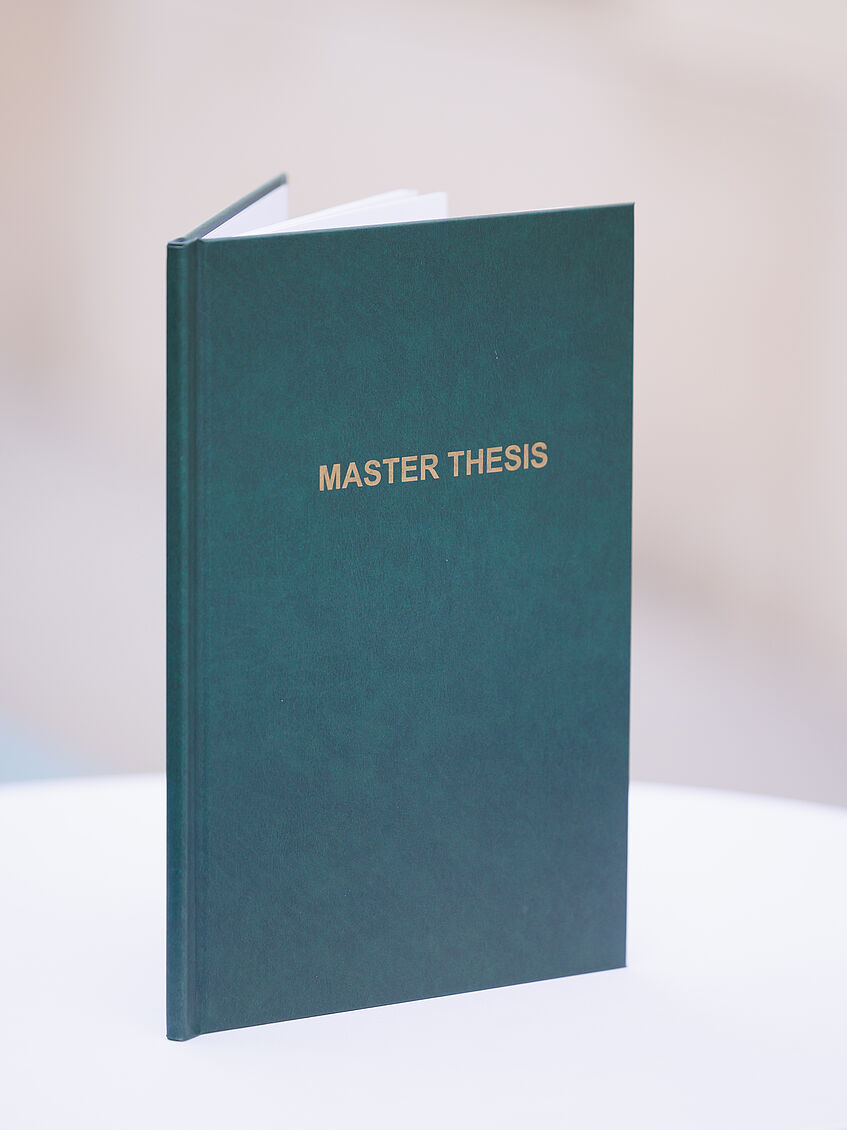Master’s thesis
On this page you will find information about the master's thesis, from finding suitable supervisors and topics, to writing and submitting your thesis, to the assessment and the public defence. Forms are available here in the Downloads section below.
In continuing education master's programs, participants have to write a master’s thesis to successfully complete the program. Scope and content of the master’s thesis may differ between programs and are specified in the curriculum of the relevant program. Your Program Management supports you in administrative matters regarding your master’s thesis, from the announcement of your topic and supervisor and submission to forwarding the review.
1. Finding a topic and supervisor
You can register the topic and supervisor of your master’s thesis with your Program Management using the form “Registration of the topic of the master’s thesis and announcement of the supervisor (PGC/MT1)” (see section 8 in the Downloads).
The approval of the topic and the supervisor is a responsibility delegated to the Academic Director of your continuing education master's programs by the Studienpräses. Your topic/supervisor will be approved or rejected within four weeks.
You can obtain a list of available supervisors from your Program Management. The following persons are generally entitled to supervise theses:
- Academic Director (university professors according to section 14, para.2 of the part of the Statutes governing university studies)
- University professors (university professors; full professors; associate professors; according to section 14, para. 2 of the part of the Statutes governing university studies)
- Habilitated staff members (associate professors; according to section 14, para. 2 of the part of the Statutes governing university studies)
- Associated professors (according to section 14, para. 2 of the part of the Statutes governing university studies)
- Assistant professors (according to section 14, para. 2 of the part of the Statutes governing university studies)
- Honorary professors (according to section 14, para. 2 of the part of the Statues governing honorary professors)
- Approved (external) supervisors
Together with your application you have to submit a research proposal. The research proposal serves to provide orientation for the participant, the supervisor as well as the Academic Director.
The research proposal has to include the following information:
- Working title
- Short description
- Preliminary summary of the content and structure
- Research gap
- Question(s)
- Academic hypothesis/hypotheses
- Expected results
- Aim of the master’s thesis
- Methods
- Time and work schedule
- Preliminary bibliography
After your topic and supervisor have been confirmed, you can start writing your thesis. You agree on the deadlines for submission with the Program Management and the supervisor.
2. Writing your master's thesis
Your master's thesis has to fulfil certain academic criteria and has to be written in compliance with the rules of good academic practice. The Rectorate has issued guidelines on good academic practice, which you can find in the University Gazette (in German).
You can find information about the topics of plagiarism, copyright, as well as the use of images and data protection in social sciences on the website of the Office of the Studienpräses.
The scope of your master's thesis should be based on the requirements set by the continuing education master's program. Information regarding the scope can be obtained from the Program Management.
In any case, master’s theses have to fulfil the following criteria:
- Work according to the current state of academic research. Studies have to apply professional standards and thus have to be conducted according to the current state of academic research.
- Work in a comprehensible and earnest way. Document your research and results. Formulate research questions, present compelling arguments, structure your thesis and apply methods relevant to your field and topic. Indicate the use of other people’s ideas by applying the current citation rules of your field and specify sources in a transparent manner.
- Take a critical approach. Critically scrutinize and disclose your sources and results.
- Make your thesis accessible. Communicate your academic findings to the (academic) public in the form of publications. When you submit your master's thesis, you can also choose to make the electronic full text version of your thesis accessible.
- Your thesis should meet a high linguistic standard. Your master's thesis has to be accurate in terms of correct spelling, punctuation and grammar, as well as use an elaborate style of academic writing, including the neutral use of language.
3. Submitting your master’s thesis
As soon as your supervisor considers your master’s thesis completed, you may upload it via u:space. You will be guided through the submission on u:space step by step. The master's thesis title page will be generated during the submission process.
Your supervisor will receive a notification e-mail once the plagiarism check is completed. You will also receive a notification e-mail at your u:net address as soon as the master’s thesis has been approved for assessment.
In addition to uploading the electronic version of your thesis to u:space, you have to submit a hardbound copy of your master's thesis and a confirmation of the upload generated by u:space to the Service Center of the Postgraduate Center within one week. Please note that you need to date and sign the confirmation of the upload on the last page. You can find our current opening hours on our website at Postgraduate Center - Contact. You can also submit your master's thesis by post.
Please also check all your personal details on u:space before submitting your thesis.
4. Formal requirements for the master's thesis
Please note that all master’s theses have to comply with the formal requirements of the University of Vienna. Requirements for the hardbound version include:
- DIN A4 portrait format
- Printed on both sides
- Hardbound
For detailed information, please see the regulation on the formal requirements for the submission of academic theses published in the University Gazette of the University of Vienna (in German).
4. Formal requirements for the master's thesis

5. Restricting access to master’s theses (embargo)
In accordance with section 86 of the Universities Act, your thesis must be published by shelving the hardbound version in the Vienna University Library.
You can decide yourself whether you make the electronic full text version of your master's thesis accessible on the Internet. However, in accordance with the Universities Act, you are obliged to publish the hardbound copy of your thesis.
You have the opportunity to restrict access to (i.e. place an embargo on) the submitted copies of your master's thesis for a maximum period of five years. You have to present plausible evidence that publishing the thesis for use in the library would interfere with important legal or economic interests.
You can apply for an embargo on your master’s thesis using the form “Master’s thesis embargo (PGC/MT3)” (see 8. Downloads). You have to submit the completed form together with the hardbound copy of your master’s thesis or send it to abschluss.pgc@univie.ac.at.
6. Assessment of the master’s thesis
Your supervisor will assess your master's thesis within two months of submission. The assessment of your master's thesis should explain the assessment criteria in a detailed and comprehensible way. Upon request, you can view the assessment documents.
7. Public defence
According to section 9 of the part of the Statutes of the University of Vienna governing university studies, the public defence is the last examination prior to graduating from a master’s program or doctoral program and consists of a public defence of the master's thesis and an examination by an examination committee in the form of a single examination. You can find detailed provisions on the public defence in your continuing education master's programs in the curriculum (in German).
Your Program Management supports you in scheduling a date, appointing the examination committee and regarding the procedure of your public defence. After successfully completing the public defence, upon request, you receive a confirmation of the completion of the last required assessment in your continuing education master's programs.
8. Downloads
You can find all forms relevant for the master's thesis below. We can also provide you with a checklist containing the most important information about the master's thesis which will help you keep track of everything.


